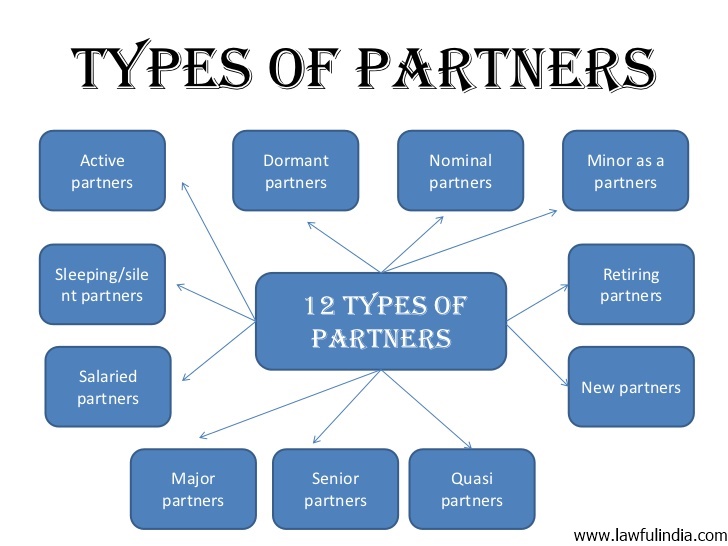There are different types of partners in partnership firm and they may be classified as under:
You may also like to Read:
Types of Partners:
- General, Active or Working Partner:
This is the first type of partner in partnership business.The partner who provides capital and takes the active part in the conduct of business is known as a general or active partner. He is also known as working partner who gives special assistance to the firm. He may or may not be renewed by him. It depends upon the agreement between the partners. - Inactive, Dormant or Sleeping Partner:
The partner who provides capital to the business and shares in the profit or loss of the firm but does not participate in the management is known as an inactive, dormant or sleeping partner. - Nominal Partner:
A nominal partner is one who lends his name to the firm as a partner. Such partner does not invest any capital nor he participates in management. However, his liability towards third parties is just like the other general partners. - Partner in Profit Only: A person may become a partner for sharing profits only but he does not get a share in its loss. He provides capital and is also responsible to third parties like other partners. Such a partner is generally inactive but associated with his money and goodwill.
- Limited Partner: A limited partner is a partner whose liability is limited to his invested capital only. Such partner cannot take part in the management of the business but he can inspect the accounts and receive profit from the business. Moreover, a partnership cannot be established only with limited partners.

Types of Partners - Secret Partner: Some people become a partner but his membership is kept secret from outsiders. Such partner is known as a secret partner. His liability is unlimited and liable for the losses of the business. He can take part in the working of the business.
- Partner by Disposal or Holding Out: When a person is not a partner but poses himself as a partner either by words or in writing, he is called a partner by disposal or holding out. He shall be liable to an outsider who deals with the firm on the presumption of that person being a partner in the business though is not a partner and does not contribute anything to the business.
- Minor Partner: A minor is a type of partner who cannot enter into a contract according to the act. So a minor cannot be made partner in the real sense of the term. However, a minor may be taken as a partner with the consent of all partners. He is like a limited partner. His personal property is not liable to pay the debts of the firm. However, he can share in partnership property and profits of the firm. He cannot take an active part in the management of the firm.
- Retired or Outgoing Partner: A partner is known as retired or outgoing partner when he leaves the firm but other partners continue to carry on the business. He is liable for all the debts of the firm, which were incurred before his retirement. He may continue to be liable if proper notice of his retirement is not given to the creditors.
- Incoming Partner: A person who joins an existing firm with the consent of all the existing partners is known as a new or incoming partner. He is not held liable for the debts and obligations of the firm incurred before his joining the firm. However, he may be held liable for such debts only when he agrees to it and the creditors have informed accordingly. Incoming partner has not only to contribute to the capital of the firm but also to pay some goodwill to the existing partners,
- Quasi Partner: This is the last types of partnerships in my list. A quasi-partner is one who is no longer a partner of business but has left his capital in the business as a loan. He receives interest on such as loan is not paid off.
If you want to learn more about types of partners in partnership business you can visit Article Library.
